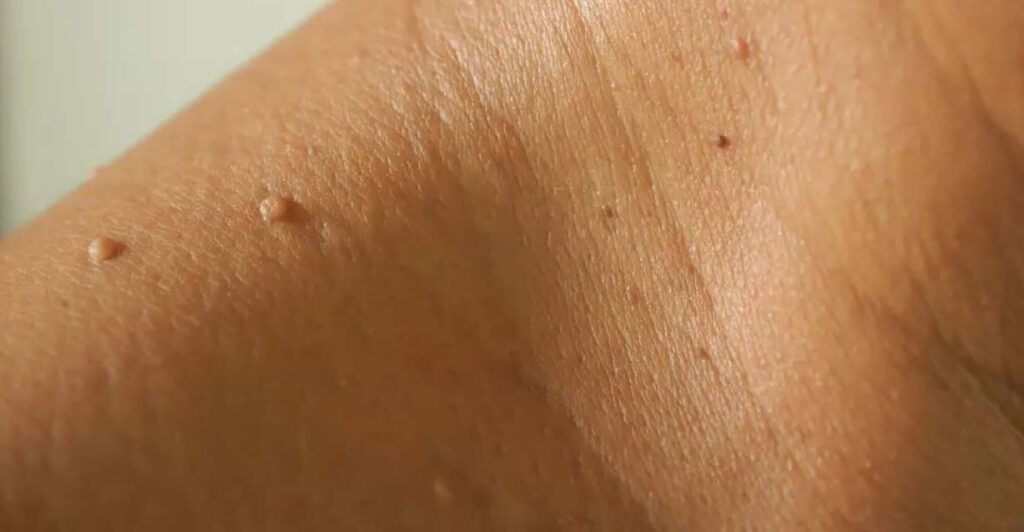Skin Tags

What are skin tags?
Skin tags are small, benign growths that typically appear on the skin in areas where skin rubs against skin or clothing, such as the neck, armpits, and groin. They are usually the same color as the surrounding skin or slightly darker, and they can vary in size from very small to large. They are benign and typically do not cause any symptoms, but they can be removed for cosmetic reasons.
Why do skin tags occur?
The exact cause of skin tags is not known, but several factors are thought to contribute to their formation.
One possible cause is friction. When skin rubs against skin or clothing, it can cause small growths to form. This is why skin tags are often found in areas where skin rubs against skin, such as the neck, armpits, and groin.
Another possible cause is genetics. Some people may be more prone to developing skin tags due to their genetics.
Hormones may also play a role in the development of skin tags. Skin tags are more common during pregnancy and in people who have certain hormonal disorders, such as diabetes.
Obesity is also associated with an increased risk of skin tags.
Additionally, people with a family history of skin tags are more likely to develop them as well.
What are the treatment options for skin tags?
There are several treatment options for skin tags, which include:
Cryotherapy: This involves freezing the skin tag with liquid nitrogen, causing it to fall off.
Excision: A small, sharp scalpel is used to cut off the skin tag. This method is typically used for larger skin tags or those that are located in sensitive areas.
Ligation: This involves tying a piece of thread or dental floss around the base of the skin tag, cutting off its blood supply, and causing it to fall off.
Electrocautery: This is a procedure that uses an electrical current to burn off the skin tag.
Topical creams: Some over the counter creams contain compounds like salicylic acid or tea tree oil that may help reduce the size of skin tags.
Natural remedies: Some people may choose to use natural remedies such as tea tree oil, apple cider vinegar, or castor oil to remove skin tags.
It’s important to note that before trying any treatment, it’s best to consult a dermatologist or a doctor to confirm the diagnosis and to choose the best treatment option based on the location, size and number of skin tags, and the individual’s preference.
Can skin tags reoccur after treatment?
Skin tags can reoccur after treatment, although it is not very common. Once a skin tag is removed, it does not grow back in the same spot. However, it’s possible for new skin tags to form in other areas of the body.
Some factors that may increase the risk of recurrence include:
Friction: As mentioned before, skin tags are often caused by friction, so if the area where the skin tag was removed is prone to rubbing or friction, new skin tags may form.
Genetics: If a person is genetically predisposed to develop skin tags, they may be more likely to develop new ones even after treatment.
Hormonal changes: Hormonal changes, such as pregnancy or certain medical conditions, may increase the risk of new skin tags forming.
It’s also worth noting that if you are self treating skin tags with over the counter creams or natural remedies, they may not fully remove the skin tags, and it may only cause the skin tag to shrink or dry out and fall off. In this case, the skin tag may reoccur.
If you notice new skin tags forming, it’s best to consult a dermatologist to have them evaluated and treated if necessary.
Can weight gain cause skin tags?
Weight gain may increase the risk of developing skin tags. Obesity is associated with an increased risk of skin tags, and people who are overweight or obese may be more likely to develop them. This is thought to be due to the increased levels of insulin in the body which is a hormone that regulates blood sugar levels. High levels of insulin can lead to changes in the skin that can promote the growth of skin tags.
Additionally, skin tags are more common in areas where skin rubs against skin or clothing, and excess weight can cause skin folds and creases, which can lead to increased friction and rubbing, which in turn can contribute to the formation of skin tags.
However, it’s important to note that not everyone who is overweight or obese will develop skin tags, and not everyone who has skin tags is overweight or obese. There are many other factors that can contribute to the formation of skin tags such as genetics and hormonal changes.
If you are concerned about the formation of skin tags, it’s always best to consult with a dermatologist. They can examine the skin tags and recommend the best course of action if necessary.


